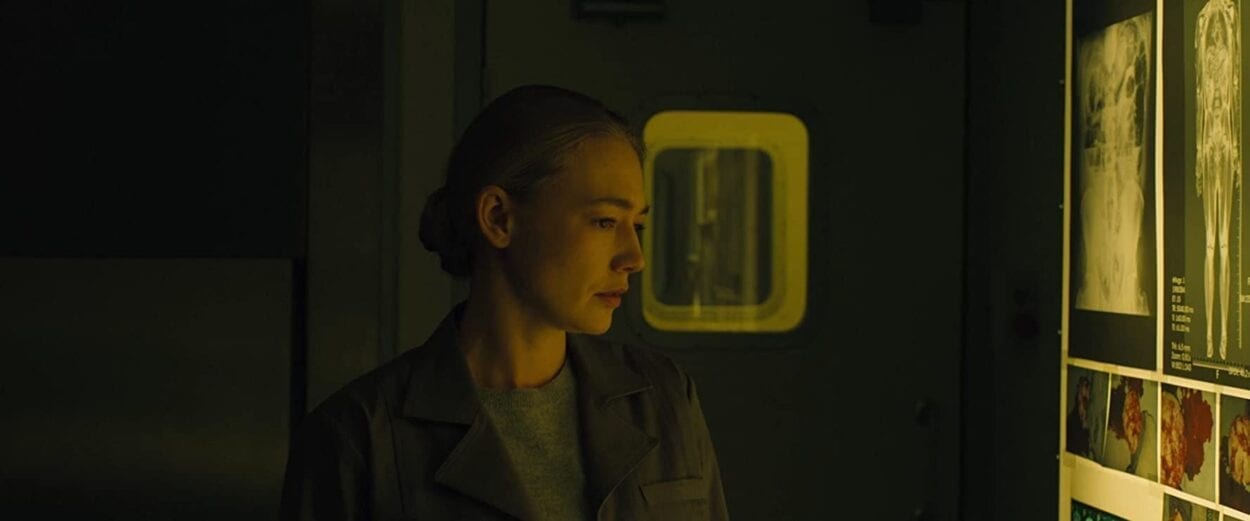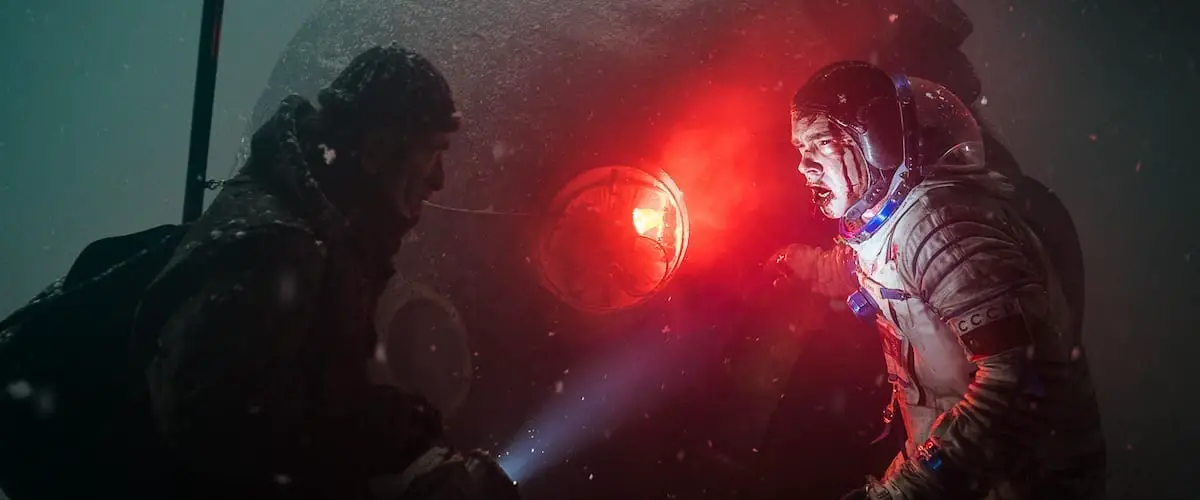I was immediately excited when I became aware of Sputnik. I am a huge fan of both sci-fi and horror and there is nothing I love more than when the two genres intersect. Sputnik does this to maximum effect. Set during Soviet-era Russia, Sputnik is centered around a Doctor who has been called to a secret research facility to examine the mental stability of a returning cosmonaut that was involved in a mysterious accident whilst in space. As Sputnik unfolds we, just like the Doctor, begin to understand that the cosmonaut did not return unscathed from his trip, nor was he alone. He has returned with an otherworldy parasitic passenger.
The parallels between Sputnik and classics of the genre like Alien are clear for all to see, but this is not just some carbon copy. Sputnik is wholly unique and original from minute one. Egor Abramenko made sure to make us all readily aware of the environment that the characters are living in and what place our protagonist Doctor Tatyana Yuryevna Klimova has in this world. The Doctor is looked upon with contempt for her unorthodox methods, but it is her ability to look outside of the box that draws the attention of Colonel Semiradov, the commander of the aforementioned secret facility.
The role of Doctor Klimova is filled by Oksana Akinshina, and she acts as the eyes of the audience throughout the piece. Akinshina plays the part with a great deal of complexity. It is clear that she is carrying a personal burden and that this has made her introspective. Dr. Klimova heals people because she too is broken, her past traumas have come to define her and the way she views the world. She acts as our window into this world of Soviet secrecy, she will have to peel back each layer of this deep dark mystery that lays hidden within the remote base.

Akinshina’s performance is not Sputnik’s only strength, Fyodor Bondarchuk puts in a supremely Soviet showing as the battle-hardened Colonel Semiradov. He exudes everything about the Soviet Union, and this was Abramenko’s intent. He uses Colonel Semiradov to encapsulate everything about the mentality within the Soviet military at that time. The Colonel is consumed by secrecy and by the need to keep the Union strong. He is a single-minded man that is stuck in his ways and only sees the creature as nothing more than a weapon, which is what puts him at odds with Dr. Klimova.
It is these interactions between the core cast that holds your attention throughout. The performances are every bit as fascinating as the characters themselves. The core cast is so strong and they carry Sputnik brilliantly. Pyotr Fyodorov’s turn as the infected cosmonaut Konstantin Veshnyakov is excellent. It is clear to see how tortured he is by the choices that lay before him. The relationship he shares with the parasite is like a contorted version of Eddie Brock’s existence with the symbiote Venom.
This relationship is more evidence of the influences that brought Sputnik into existence. They reside within every corner of its narrative. The continued proof of these influences lies with the isolation of the facility. Its remoteness is reminiscent of U.S. Outpost 31 from John Carpenter’s The Thing. Just like Carpenter’s cult classic, Sputnik uses the location of the base to instill an extra level of fear into the audience as much as the characters. Sputnik reminds you that there is no escape for its characters, that the vastness of their surroundings offers nothing but a harsh and unforgiving wilderness.
This is what I love about isolation horror. The characters are trapped both inside and out. This makes the confines of the base seem even more claustrophobic and the vastness of the surroundings even vaster and more inescapable. The remoteness creates the classic “damned if you do, damned if you don’t” scenario. It leaves the characters with their backs against the wall or against the nothingness that will engulf them if they dare step outside. This creates a heightened sense of things, but it’s not just the impenetrable terrain that Abramenko uses to create a sense of foreboding.

Abramenko expertly uses the hauntingly beautiful but incredibly intense score to keep the viewer on edge for the duration. When the creature itself is not on the screen, the score is used as a constant reminder that all is not well here. The way it is used gives Sputnik this astonishingly otherwordly feel and gives each moment the gravitas it deserves. Abramenko went to great lengths to convey to the audience the magnitude of the events that are transpiring; to do this, he uses every tool at his disposal, which he does with intelligent efficiency.
Abramenko takes care to keep Sputnik well balanced. There is never too much of one thing—it is not just the secrecy or the isolation that he uses to keep the audience off-kilter. Just like the classics, Abramenko builds Sputnik slowly, and the payoff is more than worth the wait. The moment you first lay eyes on the alien is terrifyingly triumphant. The special effects that are deployed to bring the creature to life are incredibly textured. It is gorgeous in its grotesqueness, and every moment it is on the screen is so fascinating. Although you are fascinated, Abramenko never allows you to feel at ease with this creature.
Abramenko goes to great pains to remind the audience that the alien is far from a mindless beast. It is always calculating, trying to figure out its surroundings, not unlike the good Doctor herself. The interactions between Dr. Klimova and the creature are spellbinding. You can not help but be mesmerized as much as terrified of what might come next. It is so captivating to watch this highly adaptable alien lifeform try to figure out the Doctor as she in turn tries to understand its motives. These scenes are so intensely powerful that they leave the viewer teetering, just the slightest touch away from falling off the edge of their seat.

Abramenko paces Sputnik perfectly. Every reveal is timed and placed so carefully, and every moment in Sputnik adds to its narrative and never takes away from it. It is an incredibly versatile movie that uses its greater narrative to tell more personal stories that are every bit as enthralling as the monster of the piece. At its core, Sputnik is as much about people as it is about monsters. Abramenko never lets you forget that within these earth-altering events that these are real flawed people facing mind-boggling choices.
Even though at times Sputnik feels like an amalgamation, it never feels like an imitation. It is a haunting homage to what has come before whilst exploring terrifyingly new territory for the genre. Abramenko uses the guise of the otherwordly tale to tell human stories about broken people that have to live up to the perfect expectations of an oppressive society. Abramenko incorporates so much in Sputnik‘s narrative. Not only does he craft a chilling creature feature, but he also captures the secrecy and paranoia of the time. He keeps you all too aware that even though the threat seems so alien, it is also all too familiar.
Sputnik is available in select theaters, digital & cable VOD from August 14.


